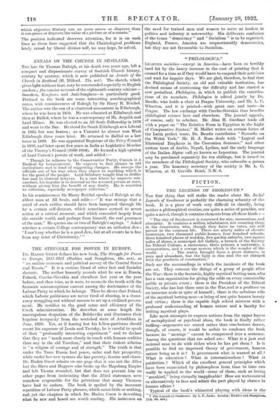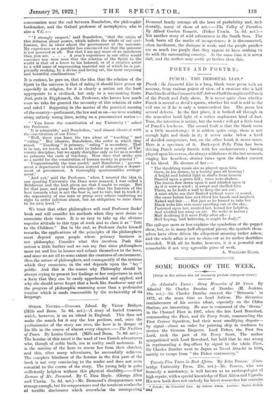FICTION.
THE LEGENDS OF SMOKEOVER.*
THE first thing that will strike the reader about Mr. Jacks' Legends of Smokeover is probably the charming urbanity of the book. It is a piece of work very difficult to classify, being neither a philosophical treatise, nor quite a series of parables, nor quite a novel, though it contains elements from all these kinds :- " The city of Smokeover is renowned for size, momentum and obscurity. It contains a million inhabitants, not counting those in the cemeteries, who, though they have no votes, are still potent in the common life. There are ninety miles of electric tramways, two thousand public-houses, four hundred schools, three hundred places of worship, five garden suburbs, two square miles of slums, a municipal Art Gallery, a branch of the Society for Ethical Culture, a racecourse, three prisons, a university, a crematorium, and a sewage system which is the wonder of the world. . . . The water, brought from a great distance, is pure and abundant, but the light is dim and the air charged with the products of combustion."
Such are the surroundings in which the incidents of the book are set. They concern the doings of a group of people after
the War: there is the fantastic, highly mystical betting man, who. has a vast organization for giving the odds on every conceivable public or private event ; there is the President of the Ethical Society, who has lost three sons in the War, and is a profiteer on
an immense scale in spite of himself ; there is the nebulous wife of the mystical betting man—a being of not quite human beauty and virtue ; there is the capable high school mistress with a profound understanding of human nature and a faculty for
writing mystical plays.
Like most attempts to express notions from the upper layers of metaphysical or psychical ideas, the book is finally rather bafffing—arguments are stated rather than conclusions drawn, though, of course, it would be unfair to condemn the book because its " message " cannot be compressed into a sentence. Among the questions that are asked are : What is a just and rational man to do with riches when he has got them ? Is it possible to find an improved theory of government, human , nature being as it is ? Is government what is wanted at all ? What is education ? What is internationalism ? What is patriotism ? Which of the excellent general principles which have been enunciated by philosophers from time to time can really be applied in the world—some of them, such as loving "mankind," being virtually inapplicable? How are we to control or alternatively to face and admit the part played by chance in human affairs ?
Typical of the book's whimsical playing with ideas is the
• The Legends of Smokeover. By L.1'. Jacks. London: Hodder. and Stoughton... [12a. Od. net) conversation near the end between Rumbelow, the philosophic bookmaker, and the Oxford professor of metaphysics, who is also a V.C. :— " I strongly suspect,' said Rumbelow, that the origin of this -delusion about power, which infects the whole of our civi- lization, lies in ideas- about the government of the universe. My experience as a gambler has convinced me that the universe is not governed at all. Not that I am any more of an unbeliever than you are. . . . A year's experience in our office would convince any sane man that the relation of the Spirit to the world is that of a lover to his beloved, or of a creative artist to a wild mass of unpromising material out of which he is per- petually evoking, by a divine and loving art, the most surprising and beautiful combinations.' " It is curious, he goes on, that the idea that the relation of the Spirit to the universe is that of ruling it should.have grown up especially in religion, for it is clearly a notion not the least appropriate to a civilized, but only to a war-making State. And, puts in Ripplemark, the Professor, who knows how much even -we take for granted the necessity of this relation of- ruler and ruled ? Supposing in the matter of the practical running of the country—parliament, the law and so on—we were working along entirely wrong lines, acting on a preconceived notion :- "'You know the constitution of my University ? ' asked the Professor.
' It is admirable,' said Rumbelow, and almost identical with the constitution of our Firm.'
Well, there you have the two ideas of " teaching " and " ruling." But observe, Rumbelow, the order in which they stand. "Teaching " is primary, " ruling " is secondary. That is to say, we teach, not in order to bolster up a system of Uni- versity discipline, but we apply discipline only so far as is needed to, promote the ends of teaching. How does that strike you as a model for the constitution of human society in general ?
' Unquestionably the true model,' said Rumbelow ; govern- ment a department of education instead of education a depart- ment of government. A thoroughly sportsmanlike arrange- ment.'
And yet,' said the Professor, when I mooted the idea in our sporting University the Dons were amazed, I was called a Bolshevist and the hint given me that I ought to resign. But let that pass, and grasp the principle—that the function of the best towards what is not the best is, not to rule, but to teach it ; the superiority of one man or group over others conferring no right to order inferiors about, but an obligation to raise them to its own level.' " We trust that other philosophers will read Professor. Jacks' book and will consider his methods when they next desire to enunciate their views. It is so easy to take up the obvious superior attitude to this type of work and to class it as " Told to the. Children." But in the end, as Professor Jacks himself remarks, the applications of the principles of the philosophers must depend upon people whose primary business is not philosophy. Consider what this involves. Push this notion a little further and we can say that since philosophers must eat and live in houses and submit themselves to the laws, ..and since we are all to some extent the creatures of environment, then the nature of philosophers, and consequently of the systems which they enunciate, in the end -depends upon the "lay" public. And this is the reason why Philosophy should be always trying to present her findings or her conjectures in such a form that they can be easily apprehended and applied, and why she should never forget that a book like Smokeover may aid the progress of philosophic reasoning more than a profounder
treatise which is made inaccessible by the technicality of its language.



































 Previous page
Previous page